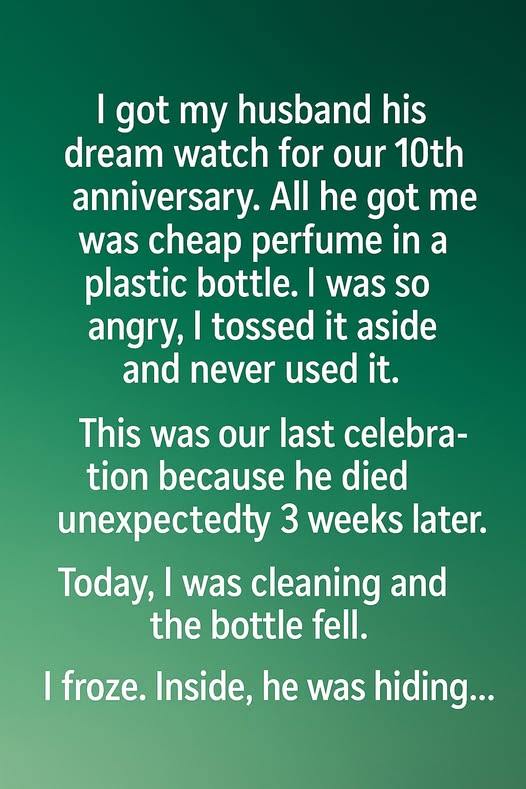I bought my husband the watch he’d been dreaming about for years — sleek, extravagant, the kind of gift he’d never buy for himself. It was our 10th anniversary, a milestone I wanted to mark properly. I pictured him opening it, that crooked smile spreading across his face, pulling me into one of those hugs that made the world feel steady.
He smiled. He hugged me. Then he handed me my gift — a small plastic bottle of perfume that looked like something from a discount bin.
I can’t say I hid my disappointment. I forced a smile that even I didn’t believe. Later that night, when he wasn’t looking, I shoved the bottle into a drawer, slamming it shut harder than necessary. For days, just seeing it irritated me. I had saved months to give him something meaningful, and he had picked up something that felt like an afterthought.
Three weeks later, he was gone.
A sudden heart attack. One moment he was teasing me about my awful singing in the car; the next, he was gone. The world didn’t just break — it collapsed. The house felt wrong, the bed too big. Silence pressed down on me like a physical weight.
Grief plays tricks on memory. I found myself replaying that anniversary night endlessly, not because of his gift, but because of my reaction. I regretted letting disappointment overshadow love. I kept thinking about the look in his eyes, the quiet tenderness I barely acknowledged. I would have given anything to go back and hold him close, to tell him the gift didn’t matter — he did.
All the little things I took for granted stung. His laugh from the kitchen, his awful whistling, the way he reminded me to drink water as if I were a child he had to keep alive. I would’ve cherished a cheap perfume every year if it meant one more morning waking beside him.
Months passed. Grief hit in waves, unpredictable and sharp, yet life kept moving. Slowly, I returned to small tasks I had abandoned — cleaning shelves, sorting drawers, dealing with the clutter left untouched since he died.
And then it happened.
I knocked the forgotten perfume bottle off the dresser. It hit the floor, the cap popped off, and something tiny — a folded slip of paper — fell near my foot.
I froze.
Expecting nothing, I bent down. But the handwriting was unmistakable — his messy, rushed letters, the kind he used when he was trying to remember something quickly.
I unfolded the note, heart racing.
“I know this perfume is temporary,” it began. “Next month I’ll surprise you with the necklace you’ve been dreaming about. Thank you for believing in me even when I don’t say it enough. You are my forever gift.”
I sank to the floor, clutching the note as tears poured down my face. I pressed it to my chest, wishing I could fold myself into it, wishing I could go back and tell him I understood, that I saw him, that I appreciated him.
He hadn’t bought me a cheap perfume out of carelessness. It was a placeholder, a first step toward something bigger, something thoughtful he knew I wanted. He had been planning a surprise, thinking ahead, loving me quietly and steadily — without fanfare.
And I had missed it.
I sat there, holding that bottle like it was gold. Its scent didn’t matter. What mattered was the intention, the message tucked inside, the love he gave quietly, without knowing it would be the last gift he ever left me.
That night, I placed it on my bedside table. Not as a reminder of my mistake, but as a reminder of him — his softness, his effort, his heart. The kind of love that works quietly in the background, unnoticed until absence makes it painfully loud.
I sprayed it once. It didn’t smell expensive. It wasn’t remarkable. But it was his. It was a token of his thoughtfulness, his love, his steady presence. And somehow, that made it beautiful.
Grief teaches things we don’t want to learn. That moments matter more than gifts. That ordinary days are the ones we miss the most. That love can be unpolished, humble, invisible until absence shows us its weight.
I used to think the perfume was cheap. I was wrong. It was priceless, holding his final, silent words for me.
Every night now, I touch the bottle gently, like I once touched his shoulder in passing. Not to mourn, but to honor what I had — a love so genuine that even its simplest gesture carried a depth I only recognized too late.
Sometimes, the real gift isn’t what’s inside the box. It’s the heart that placed it there.
And sometimes, tragically, we only grasp the value of that heart when it no longer beats beside us.
